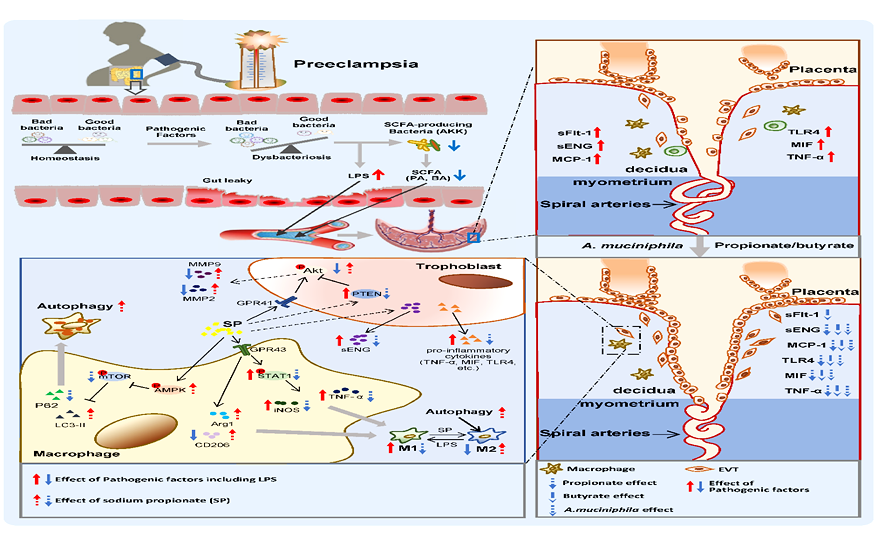Research groups led by Zhang Qunye and Prof. Zhang Cheng of the MOE and NHC Key Laboratory of Cardiovascular Remodeling and Function Research have made great progress in the field of intestinal flora and cardiovascular disease. Two high-level papers have been published in
Cell’s sub journal
Cell Host & Microbe (Chinese Academy of Sciences(CAS) Journal ranking Q1, latest IF:31.316) and American Heart Association Journal
Circulation Research (Chinese Academy of Sciences(CAS) Journal ranking Q1, latest IF: 23.213), which has been highly appraised by the international academic circles.

Abdominal aortic aneurysm (AAA) is a disease caused by degeneration of the aortic wall, but the pathogenesis is unknown. The onset of AAA is insidious, and once the tumor enlarges and ruptures, the mortality rate is over 80%. At present, there is no non-operative intervention effective for this disease. Recent studies have shown that intestinal microorganisms and their metabolites play a key role in host homeostasis regulation and the occurrence and development of a variety of diseases. Through in vivo and in vitro experiments, the research team proved that down-regulation of NOX2 expression of neutrophils infiltrated by AAA tumor is the mechanism of butyrate inhibiting NETs’ formation. In short, probiotics
Roseburia intestinalis and its metabolite butyric acid can significantly inhibit AAA lesions by inhibit the formation of NOX2-dependent neutrophil trapping network, which has an important clinical application prospect for the prevention and treatment of AAA. This study was published in
Cell Host & Microbe, a sub-journal of
Cell, and was recommended as one of the two featured articles in the journal. Tian Zhenyu, a doctoral student of the Department of Cardiology, Qilu Hospital of Shandong University, is the first author of this article. Professor Zhang Qunye and Professor Zhang Cheng from Qilu Hospital, and Professor Wang Zhe of the Department of Health Endocrinology of Shandong Provincial Hospital Affiliated to Shandong First Medical University are co-corresponding authors of this article. Qilu Hospital of Shandong University is the first and the corresponding author’s affiliation.

Preeclampsia is a pregnancy-specific disorder that manifests primarily as new hypertension and proteinuria after 20 weeks of gestation and is an important cause of maternal and perinatal mortality. At present, there is still lack of early screening and effective treatment for preeclampsia. Placental dysfunction is a key factor of the pathogenesis of preeclampsia, but the specific mechanism is unknown. It has been reported that there is obvious imbalance of intestinal flora in clinical patients and animal models who suffer from preeclampsia, but the causal relationship between intestinal flora imbalance and preeclampsia and its mechanism are not clear. Research groups led by Professor Zhang Qunye, Professor Zhang Cheng and Professor Wang Zhe used 16s rRNA sequencing to find that compared with normal pregnant women, the intestinal flora of patients with preeclampsia was significantly dysfunctional, which is mainly characterized by a significant decrease in the abundance of Akkmermansia bacteria which secrets short-chain fatty acids (SCFAs). In conclusion, this study proved that the imbalance of intestinal flora is an important factor in preeclampsia, clarified the molecular mechanism of this causal relationship, and revealed the value of biomarkers composed of Akkermansia, Oscillibacter and SCFAs in the auxiliary screening of preeclampsia and the clinical application prospect of A.muciniphila, propionic acid or butyric acid in the adjuvant therapy of preeclampsia. The study was published in
Circulation Research, a leading journal in the field of basic cardiovascular research sponsored by the American Heart Association. The magazine’s editorial comments think that this work further enriches and confirms the theory that the prevention of intestinal flora imbalance and the intake of probiotics contribute to the prevention and treatment of preeclampsia, which has important clinical significance. Jin Jiajia, a doctoral student of the Department of Cardiology, Qilu Hospital of Shandong University, is the first author of this article. Gao Liaomei, a doctoral student at the Department of Endocrinology of Shandong Provincial Hospital Affiliated to Shandong First Medical University, and Zou Xiuli, Deputy Chief Physician of Liaocheng People's Hospital are co-first authors of the paper. Professor Zhang Qunye and Professor Zhang Cheng from the Cardiovascular Key Laboratory of Qilu Hospital of Shandong University, Professor Wang Zhe of the Department of Health Endocrinology of Shandong Provincial Hospital Affiliated to Shandong First Medical University, and Professor Wu Tiejun of the ICU of Liaocheng People’s Hospital are co-corresponding authors of the paper. Qilu Hospital of Shandong University is the first and the corresponding author’s affiliation.

